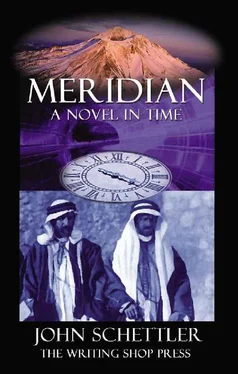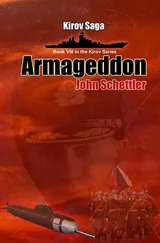“What?” Jen was looking from one to the other. She had been trained on the panel readouts, and knew all the appropriate status calls for her station, but very little about the actual theory and mechanism behind it all. Paul’s quiet warning to her added a sense of urgency to the situation. Something was clearly wrong, but she did not know exactly what it was.
Maeve gave her a stern look. “What does the color bar read now?”
“Blue at zero point two-five.”
“That’s close,” said Kelly trying to salvage something from the situation. “It’s well under one percent, which means—”
“Which means they’re likely to land in November,” Maeve interrupted him. “What century they end up in, however, is anybody’s guess.”
“It’s a queer sensation, this secret belief that one stands on the brink of the world’s greatest catastrophe.”
Henry Brooke Adams
Time: Unknown
They arrived in a haze of icy fog, surrounded by the darkness of night. As the wet mist around them slowly dissipated they felt the chill of another world embrace them; another time. They had come from the heart of a great metropolitan city in the 21 stcentury, and arrived in the empty darkness of the open desert, half a world away. The one common element these two places shared was the rain. They left one rain storm lumbering in from the Pacific Ocean to find another in the midst of a starless, gloomy night. The heavy overcast obscured the sky with a dreary weight.
Paul opened his eyes, groping forward with his free arm into the inky blackness around them. As the misty vapors dissipated, the dark shapes of low, rolling hills emerged in his forward field of vision. He took a deep breath, amazed at the strange smells in the air as he drank in his first taste of another time. They were through the Arch, and alive. It worked! His elation thrilled him to the bone and he was taken with an involuntary shiver.
Nordhausen still held his right arm in an iron grip, but he slowly let go. Paul could hear him breathing heavily and caught the vapor of his breath in the cold night air. “We made it through,” he said.
Nordhausen was looking around them in all directions, trying to immediately place some familiar object in his new frame of reference. He felt a queasy, dizzy feeling, as though he had just been spun around and around, and then let go to grope his way in the dark. He dropped to his knees.
“You all right?” Paul knelt beside him.
Nordhausen put a hand down to steady himself, feeling the clammy wetness of the ground broken by sharp, flinty gravel. He took a deep breath. “Amazing!” he exclaimed. “It’s so dark.”
“No city lights, no cars, no streetlamps,” said Paul. “And on a night like this we won’t even get much starlight. Did you bother to check the phase of the moon?”
“Yes,” said Nordhausen, “It was very regular that month. Full on the 1st of the month, a half moon on the 7 th, dark on the 14 th, and full again on the 28 th. If we’re on target we should see a waning crescent for the 10 th. Do you see it? It should be up by now, unless this is a pre-dawn hour.”
“Can’t make out a thing in this weather, but you’re right. It’s dark as hell. And cold!”
“We’ll find out soon enough, I suppose,” said Nordhausen.
“Are you all right?” Paul put a hand on Robert’s shoulder.
“That was weird . Breathtaking! Did you open your eyes?”
“Are you kidding?”
“You mean you closed your eyes? Oh, Paul, it was awesome. The range of color and the movement of the light was head spinning. It had a discernable rhythm to it, though. Almost… musical in organization. I’m just a little dizzy, that’s all. It’s passing. Here, help me up off these wet stones!”
“We should find some cover. It’s cold! I thought this was the desert.”
“It is the desert, but it can get down near freezing here in the winter. You don’t have much fat on those bones. I hope you dressed for the rain. I tried to warn you.”
Paul extended a hand to help Nordhausen to his feet. Their eyes were gradually adjusting to the darkness, but the light drizzle of rain masked the surrounding skyline and they could barely make out the formless undulation of the ground.
“I can see how Lawrence’s men would miss the first train,” said Nordhausen. Is that a hill over there?”
“Looks like a low ridge. There may be a wadi at the bottom that isn’t flooded out, or even a cave. Let’s move in that direction. If we can get ourselves out of the rain and hunker down until dawn, we should be able to see the Hejaz Railway from the top of that rise.”
Robert nodded his agreement and the two men began to pick their way over the broken ground. It was slow going, for the area was littered with sharp-edged rocks that were slick with the rain and made for very treacherous footing. Nordhausen nearly slipped and fell, righting himself at the last minute. He stooped for a moment, to get his breath, and his eye caught something on the ground that he didn’t expect to find.
“That’s odd,” he murmured to himself as he picked up a smooth rock and hefted it in his palm. He squinted about him, noting how the minimal light seemed to be reflected from similar stones here and there. Paul came up behind him and he struggled up onto his feet again. “A bit out of shape, I see,” he breathed.
“Me too,” said Paul. “The air seems so heavy. Maybe we’re just feeling the effects of the time shift.”
“Or the creep of old age. We’re both over forty now, you know.”
They struggled along, eventually reaching a low shelf of stone at the base of the ridge. At one point the effects of erosion had cut away the softer ground near the bed of the wadi and formed an overarching rim of rock that provided some shelter from the rain. By the time they had sloshed their way across a thin stream of runoff, they were wet, tired and shivering with the cold. They huddled in the dark, their backs pressed against the hard stone behind them to avoid the occasional wet gusts of drizzle and rain.
“What miserable weather,” said Paul.
“Not what you expected, I know,” Nordhausen replied. “At least the rain seems to be tapering off.”
“What’s that smell?” Paul screwed up his face. “Where’s all that sweet, unpolluted desert air?”
“Yes, I noticed that too. And the rain has a bitter taste to it as well. Very odd…” Nordhausen was still rolling the small rock in the palm of his hand, noting the smooth, even surface, deep in thought. He leaned out, squinting up past the lip of overhanging stone to try and spy out the moon or some guiding star. “Moon must be down,” he said. “But I think the sun will be up soon. See that red smear off there? I think we may be getting close to dawn. It seems to be growing lighter up ahead. That would be east, then. At least we’re heading in the right direction.”
“Want to look for a way up this ridge? Might warm us up.” Paul was tired, but driven by the urgency of their mission. He stood up, stooping to avoid the outcropping of rock overhead, and started down into the wadi, grateful to be moving to get some blood flowing through his limbs. The rainwater had run off quickly, and they were able to make their way along the wadi using little islands of gravely rock embedded in a fine reddish silt. Paul angled to the right, looking for a safe way up the side of the ridge and picked out a path that seemed promising. He looked over his shoulder every so often, and saw that Nordhausen was falling behind him as he climbed. The professor seemed to stop now and then, picking at the ground or peering at an occasional clump of withered plant growth. Paul gestured at him to hurry.
Читать дальше












